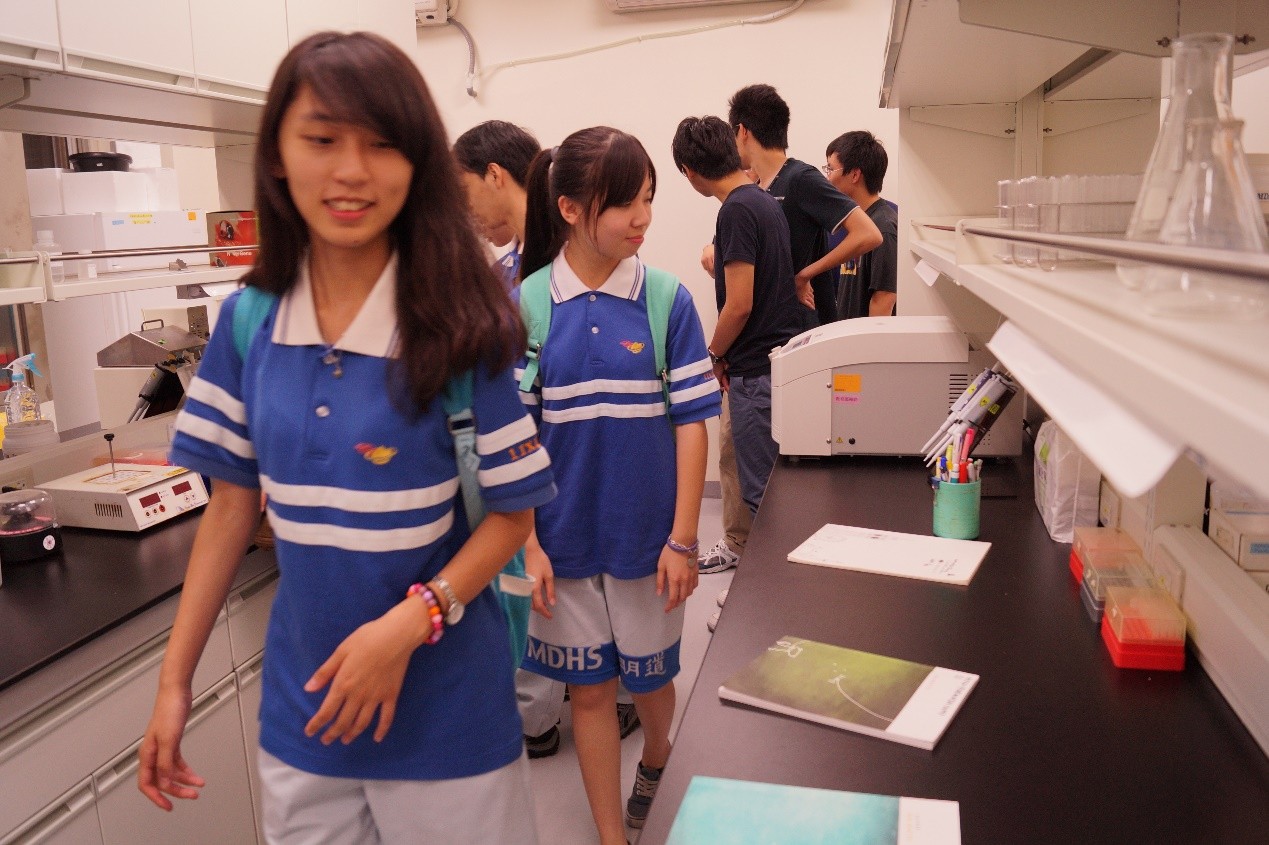Team:NCTU Formosa/human practice
From 2014.igem.org
(→XMU video conference) |
(→SNU-visit) |
||
| Line 51: | Line 51: | ||
===SNU-visit=== | ===SNU-visit=== | ||
<p></p> | <p></p> | ||
| + | Few weeks after the iGEM conference, some researchers of the Seoul National University came to visit us at the NCTU. We delivered a short presentation of our project and showed them our lab settings. As they have not yet established an iGEM team, they appeared intrigued by our demonstrations and were very keen to set up a team next year. Therefore, we made a further introduction of synthetic biology to them, and shared then with our experiences in establishing an iGEM team | ||
===NCHU-visition=== | ===NCHU-visition=== | ||
Revision as of 17:54, 31 August 2014
Contents |
MDHS-conference
We invited Mingdao High school iGEM team to exchange ideas with us. We also held a pizza party to enhance more fun in this event.
We asked Mingdao high school to give a brief introduction to their project-Odor Let It Die. It’s really an interesting and creative idea. Although they are just high school students, their English presenters clearly explained what problems they want to solve. In the discussion section, we gave them several feedback and suggestions to perfect their project.
As for our presenting section, we successfully caught their eyes with our creative project-Operation Debug, which is to attract pests in the farm with PBAN. After our amazing presentation, we believed they not only learned more knowledge about synthetic biology but also impressed by the future development potential of this field.
Because some high school students are pretty curious about our laboratory, so we guided them to pay a visit to lab at the end of this event. We introduce the equipment we usually use in the process of DNA synthesis.
Video conferencing with Xiamen University
We had a video conferencing with the iGEM team of Xiamen University, China, in May. As both teams just started their own research projects at that time, the main topics of this video conferencing only consisted of a brief description or introduction of the protocols for each other’s project, how the research team was established and organized. According to this short conferencing, we knew the Xiamen team mainly consists of sophomores or juniors, whereas they were surprised to learn that almost 90% of our team members are freshmen.
Biocamp
In the summer, our department held a bio-camp. We spent a morning teaching them what synthetic biology is and introducing them to iGEM. In the beginning, I thought they might fall asleep during our lecture, but it was totally different than I thought. All of them were fascinated by the idea of using enzymes and different assemblies of biobricks to create new functions, and interacted enthusiastically with us. For high school students, it is hard to imagine how scientists transfer genes into bacteria and plants. So we used some easy ways to explain how we do those jobs and we also designed some games to help them learn the basics of biobrick assembly. After this class, I think they gained a deeper understanding of synthetic biology. Hopefully through letting them think that iGEM is cool, we inspired them to become future iGEMers or even synthetic biologists.
Conference
We hosted the 2nd iGEM Conference from August 3th to August 7th at the NCTU. More than 20 research teams were invited this year. Since this was the second time for us to host the Conference, how to make it better and more intriguing than the previous one had proved to be a great challenge and novel experience for all members of the NCTU_Formosa Team (2014).
Although we had encountered many problems at the beginning, we were extremely grateful that all the difficulties could be overcome with the assistance from our instructors and the team members of the NCTU_Formosa (2013). We were more than delighted to see the iGEM 2014 turned out to be a wonderful and successful conference in that the whole meeting went smoothly, and more details and trivialities could be well taken care of throughout each individual section.
As a warm-up Asian Jamboree, the Conference set up a stage for each team to present their projects and posters for exchanging research ideas, sharing experiences, or acknowledging difficulties that all delegates have encountered. We were not only grateful to acquire all the feedbacks and advices on our project, but were also deeply intrigued and impressed by the projects carried out by the other teams. Their endeavors and methods were indeed very inspiring that have helped us to generate more research ideas, and to raise the possibilities for collaborations with other teams.
In addition to the scientific sections, we also arranged several social events, including a welcome party, one-day trip in Taipei, and a roadside banquet as the farewell party. We believed the traditional Taiwanese cuisines and unique foods of night markets might be the most effective vehicle to make friends and strengthen our relationships with the delegates from abroad. Despite being exhausted in planning and hosting all these events, we hoped that all delegates felt entertained and welcomed. Thanks to all the members of the iGEM, the Conference not only provided us with the opportunity to promote our project, but also created a valuable experience or ‘collective memory’ that may bind all iGEMers together in the forthcoming years.
SNU-visit
Few weeks after the iGEM conference, some researchers of the Seoul National University came to visit us at the NCTU. We delivered a short presentation of our project and showed them our lab settings. As they have not yet established an iGEM team, they appeared intrigued by our demonstrations and were very keen to set up a team next year. Therefore, we made a further introduction of synthetic biology to them, and shared then with our experiences in establishing an iGEM team
NCHU-visition
Futurework
Surveys
 "
"



